
Jacob, later given the name Israel, is regarded as a patriarch of the Israelites and is an important figure in Abrahamic religions, such as Judaism, Samaritanism, Christianity, and Islam. Jacob first appears in the Book of Genesis, originating from the Hebrew tradition in the Torah. Described as the son of Isaac and Rebecca, and the grandson of Abraham, Sarah, and Bethuel, Jacob is presented as the second-born among Isaac's children. His fraternal twin brother is the elder, named Esau, according to the biblical account. Jacob is said to have bought Esau's birthright and, with his mother's help, deceived his aging father to bless him instead of Esau. Later in the narrative, following a severe drought in his homeland of Canaan, Jacob and his descendants, with the help of his son Joseph, moved to Egypt where Jacob died at the age of 147. He is supposed to have been buried in the Cave of Machpelah.
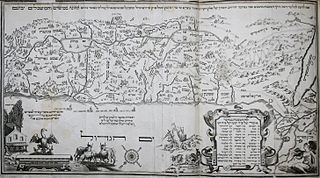
The Tribe of Joseph is one of the Tribes of Israel in biblical tradition. Since the tribes of Ephraim and Manasseh together traditionally constituted the "tribe of Joseph", it was often not listed as one of the tribes, in favour of Ephraim and Manasseh being listed in its place; consequently it was often termed the House of Joseph, to avoid the use of the term tribe. Even though Ephraim and Manasseh were Joseph’s sons, they were considered heads of two of the twelve tribes of Israel because Joseph’s father, Jacob, adopted Ephraim and Manasseh as his own sons.

Leah appears in the Hebrew Bible as one of the two wives of the Biblical patriarch Jacob. Leah was Jacob's first wife, and the older sister of his second wife Rachel. She is the mother of Jacob's first son Reuben. She has three more sons, namely Simeon, Levi and Judah, but does not bear another son until Rachel offers her a night with Jacob in exchange for some mandrake root. Leah gives birth to two more sons after this, Issachar and Zebulun, and to Jacob's only daughter, Dinah.
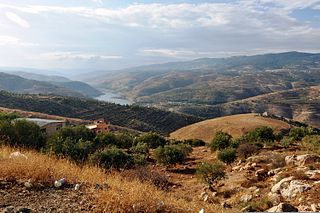
Gilead or Gilad is the ancient, historic, biblical name of the mountainous northern part of the region of Transjordan. The region is bounded in the west by the Jordan River, in the north by the deep ravine of the river Yarmouk and the region of Bashan, and in the southwest by what were known during antiquity as the "plains of Moab", with no definite boundary to the east. In some cases, "Gilead" is used in the Bible to refer to all the region east of the Jordan River. Gilead is situated in modern-day Jordan, corresponding roughly to the Irbid, Ajloun, Jerash and Balqa Governorates.
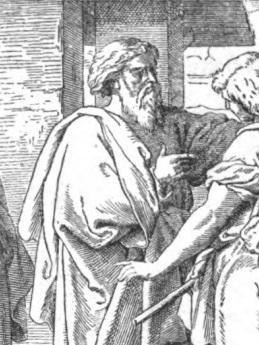
Laban, also known as Laban the Aramean, is a figure in the Book of Genesis of the Hebrew Bible. He was the brother of Rebekah, the woman who married Isaac and bore Jacob. Laban welcomed his nephew, and set him the stipulation of seven years' labour before he permitted him to marry his daughter Rachel. Laban tricked Jacob into marrying his elder daughter Leah instead. Jacob then took Rachel as his second wife, on condition of serving an additional seven years' labour.

Vayetze, Vayeitzei, or Vayetzei is the seventh weekly Torah portion in the annual Jewish cycle of Torah reading. It constitutes Genesis 28:10–32:3. The parashah tells of Jacob's travels to, life in, and return from Harran. The parashah recounts Jacob's dream of a ladder to heaven, Jacob's meeting of Rachel at the well, Jacob's time working for Laban and living with Rachel and Leah, the birth of Jacob's children, and the departure of Jacob's family from Laban.
Mizpah was a town in Gilead, where Jephthah resided, and where he assumed the command of the Israelites in a time of national danger. Here he made his rash vow; and here his daughter submitted to her mysterious fate. Some scholars say it may be the same as Ramoth-Gilead, and it is also believed by some that it is identical with the Mizpeh of Genesis 31:23, 25, 48, 49.
The Mizpah is a region in Gilead, at the foot of Mount Hermon, inhabited by Hivites. The name in Hebrew here has the article before it, 'the Mizpeh', 'the watch-tower'. The modern village of Metullah, meaning also 'the look-out', probably occupies the site so called.

Mizpah was a city of the tribe of Benjamin referred to in the Hebrew Bible.
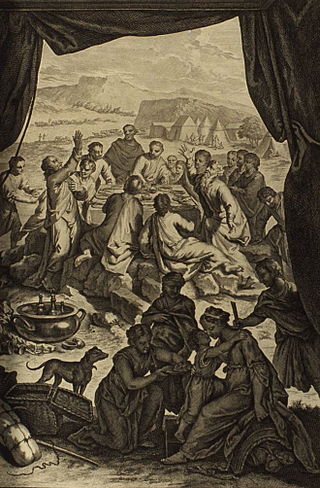
Mizpah is Hebrew for "watchtower". It is mentioned in the biblical story of Jacob and Laban, where a pile of stones marks an agreement between two people, with God as their watching witness.

Manasseh or Menashe was, according to the Book of Genesis, the first son of Joseph and Asenath. Asenath was an Egyptian woman whom the Pharaoh gave to Joseph as wife, and the daughter of Potipherah, a priest of On. Manasseh was born in Egypt before the arrival of the children of Israel from Canaan.
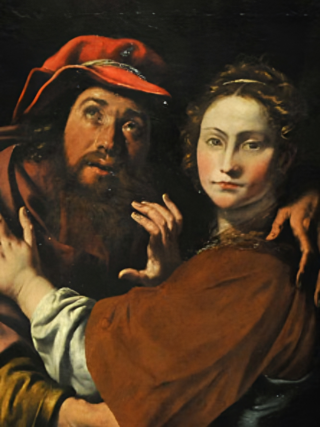
Rachel was a Biblical figure, the favorite of Jacob's two wives, and the mother of Joseph and Benjamin, two of the twelve progenitors of the tribes of Israel. Rachel's father was Laban. Her older sister was Leah, Jacob's first wife. Her aunt Rebecca was Jacob's mother.

Rebecca appears in the Hebrew Bible as the wife of Isaac and the mother of Jacob and Esau. According to biblical tradition, Rebecca's father was Bethuel the Aramean from Paddan Aram, also called Aram-Naharaim. Rebecca's brother was Laban the Aramean, and she was the granddaughter of Milcah and Nahor, the brother of Abraham. Rebecca and Isaac were one of the four couples that some believe are buried in the Cave of the Patriarchs, the other three being Adam and Eve, Abraham and Sarah, and Jacob and Leah. Most scholars have considered Rebecca's historicity uncertain.
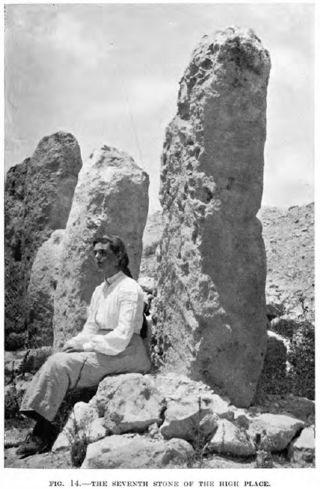
Matzevah or masseba is a term used in the Hebrew Bible for a sacred pillar, a type of standing stone. The term has been adopted by archaeologists for Israelite contexts, seldom for related cultures, such as the Canaanite and the Nabataean ones. As a second derived meaning, it is also used for a headstone or tombstone marking a Jewish grave.
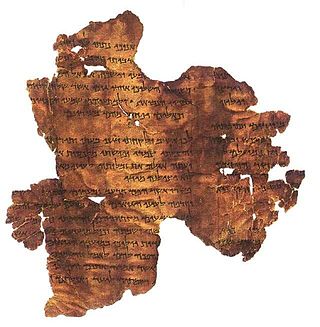
Hosea 5 is the fifth chapter of the Book of Hosea in the Hebrew Bible or the Old Testament of the Christian Bible. In the Hebrew Bible it is a part of the Book of the Twelve Minor Prophets. The book contains the prophecies attributed to the prophet Hosea, son of Beeri, and this chapter is about God's judgments against the priests, the people, and the princes of Israel, for their multiple sins, until they repent, a topic which continues to chapter 6.
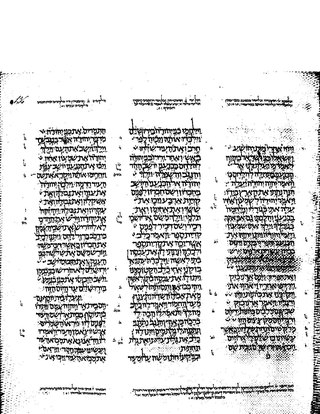
Judges 21 is the twenty-first chapter of the Book of Judges in the Old Testament or the Hebrew Bible. According to Jewish tradition the book was attributed to the prophet Samuel, but modern scholars view it as part of the Deuteronomistic History, which spans in the books of Deuteronomy to 2 Kings, attributed to nationalistic and devotedly Yahwistic writers during the time of the reformer Judean king Josiah in the 7th century BCE. This chapter records the war between the tribe of Benjamin and the other eleven tribes of Israel, belonging to a section comprising Judges 17 to 21.
Mizpah in Gilead may refer to:

The episode of the Levite's concubine, also known as the Benjamite War, in Judges 19–21 concerns a Levite from Ephraim and his concubine. They travel through the Benjamite city of Gibeah and are assailed by a mob, who wish to gang-rape the Levite. He turns his concubine over to the crowd, and they rape her until she collapses. After she dies from her ill treatment, the Levite dismembers her body and presents the remains to the other tribes of Israel. Outraged by the incident, the tribes swear that none shall give his daughter to the Benjamites for marriage, and launch a war which nearly wipes out the tribe, leaving only 600 surviving men. However, the punitive expedition is overcome by remorse, fearing that it will cause the extinction of an entire tribe. To ensure the survival of the Benjamite tribe while still complying with their oath, the Levites pillage and massacre the city of Jabesh-Gilead, none of whose residents partook in the war or in the vow, and capture its 400 maidens as wives for the Benjamites. The 200 men still lacking women are subtly allowed to abduct the maidens dancing at Shiloh.

Judges 11 is the eleventh chapter of the Book of Judges in the Old Testament or the Hebrew Bible. According to Jewish tradition the book was attributed to the prophet Samuel, but modern scholars view it as part of the Deuteronomistic History, which spans in the books of Deuteronomy to 2 Kings, attributed to nationalistic and devotedly Yahwistic writers during the time of the reformer Judean king Josiah in 7th century BCE. This chapter records the activities of judge Jephthah. belonging to a section comprising Judges 6:1 to 16:31.














